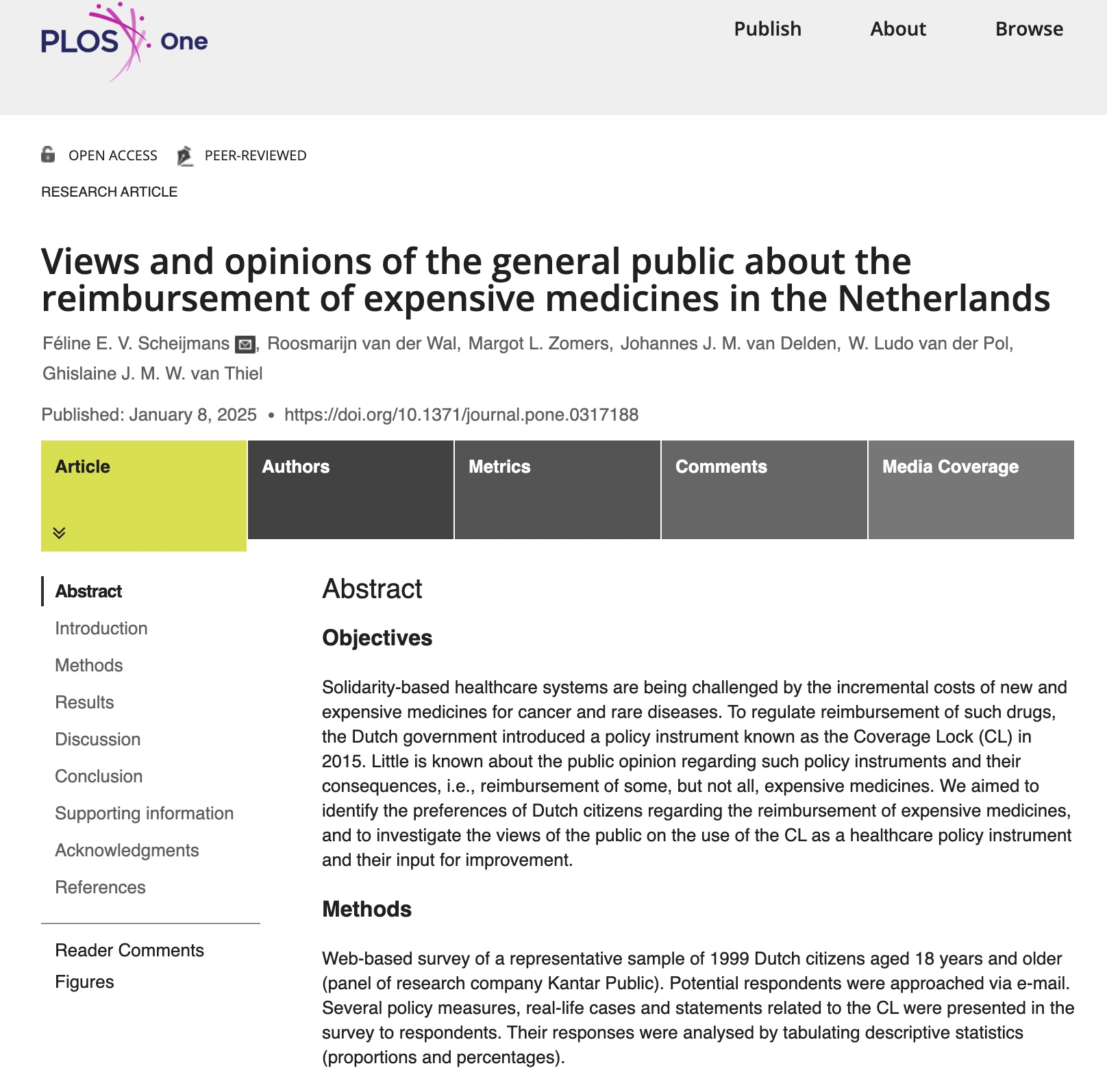Amsterdam, January 8, 2025 – A new study published in PLOS ONE offers critical insights into public opinion regarding the reimbursement of expensive medicines in the Netherlands. The research, led by Féline E. V. Scheijmans and her team from Utrecht University, evaluates Dutch citizens’ perspectives on the government’s Coverage Lock (CL) policy—a mechanism introduced in 2015 to regulate reimbursement for high-cost treatments.
The CL policy was implemented to control the rising costs of innovative medicines, particularly those used for cancer and rare diseases, by halting automatic reimbursement until extensive assessments of efficacy, cost-effectiveness, and necessity are completed. While the policy aims to maintain the financial sustainability of the healthcare system, it has also delayed access to treatment, sparking patient protests and public debate.
The study surveyed 1,179 respondents through a web-based questionnaire conducted by Kantar Public. Participants were presented with scenarios involving four real-life medicines placed under the CL: treatments for life-threatening cancer, chronic inflammatory bowel disease, Alzheimer’s dementia, and a progressive neuromuscular disorder.
Key findings in the research:
The survey revealed that 64.9% of respondents considered the CL policy unjustified. The primary concern among this group was that patients have no control over their need for expensive medicines. Conversely, 35.1% supported the policy, with many citing high drug prices and the financial strain these costs place on other healthcare services.
Despite this division, the majority of respondents preferred the CL policy over alternative reimbursement models. When asked to select between different systems, 40.3% supported the current policy, while 36.6% favored full reimbursement for all medicines, with the trade-off being cuts to other healthcare services. Only 2.9% advocated for a system with no reimbursement for high-cost medicines.
The study highlighted a nuanced approach by respondents regarding which treatments should be reimbursed. High levels of support (89.3%) were observed for reimbursing medicines that significantly improve quality of life and have no effective alternatives, such as the treatment for chronic inflammatory bowel disease. However, medicines with uncertain benefits, such as those for life-threatening cancer and Alzheimer’s dementia, received far less support (28% and 26.4%, respectively). The main reasons for opposition were concerns over poor cost-effectiveness and the need to send a message to pharmaceutical companies about unacceptable pricing practices.
Participants emphasized the importance of treatment accessibility during the CL evaluation period. Over 85% believed that patients should have access to new medicines while assessments are underway. Most favored the pharmaceutical industry bearing the interim costs of making these drugs available, particularly for patients with life-threatening conditions or no alternative treatment options.
Strengths, Limitations and Policy Recommendations
This study is one of the first to comprehensively explore public attitudes toward reimbursement policies for expensive medicines in the Netherlands. The inclusion of real-world examples allowed researchers to gain a deeper understanding of societal preferences and the reasoning behind reimbursement decisions.
However, the study acknowledged some limitations. The majority of respondents had no prior knowledge of the CL policy, which may have influenced their survey responses. Additionally, despite efforts to include diverse demographic groups, certain perspectives—particularly those from populations less accessible via online surveys—may not have been fully represented.
The findings offer practical recommendations for policymakers. To build greater public support, the government should consider enhancing transparency around the CL process and incorporating public priorities into policy revisions. This includes addressing early access to treatments and expanding the interpretation of assessment criteria to reflect broader societal values.
The Netherlands is not alone in grappling with the rising costs of innovative medicines. Countries across Europe face similar challenges in balancing access to life-saving treatments with the need for financial sustainability. This study underscores the importance of engaging the public in shaping healthcare policies that reflect both medical priorities and societal preferences.
As healthcare budgets continue to be stretched by new medical innovations, the results of this research provide valuable guidance for future policy improvements aimed at achieving a more equitable and sustainable healthcare system.
To read the full study, the access can be found here



